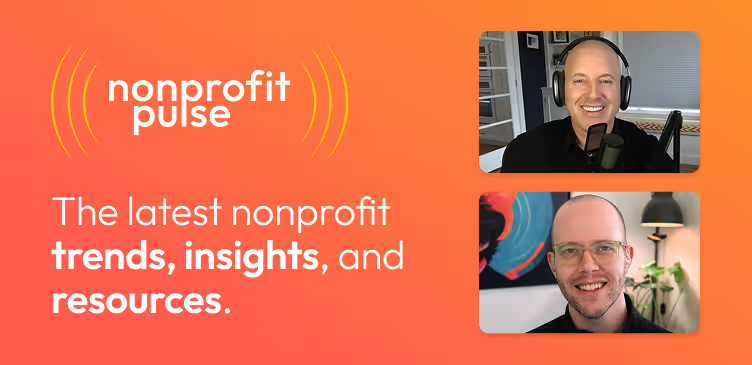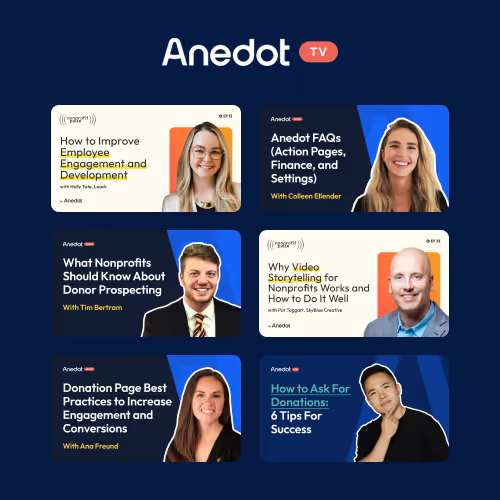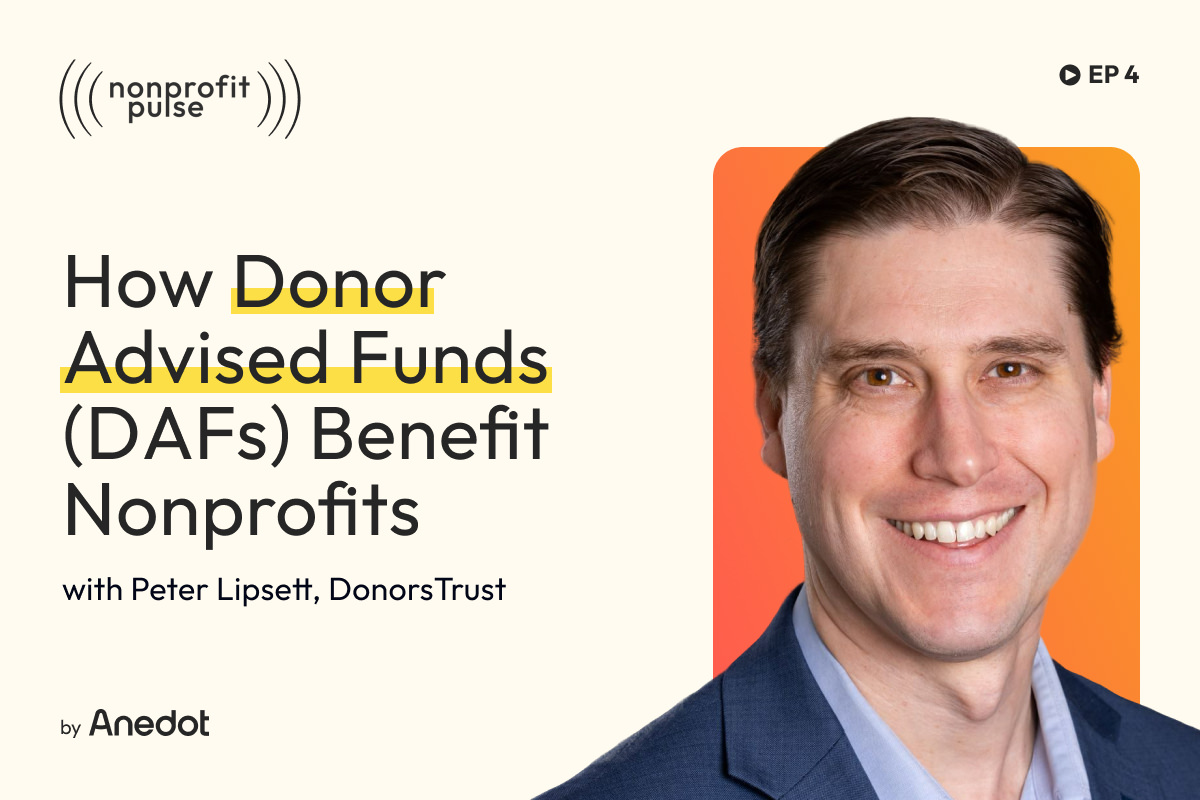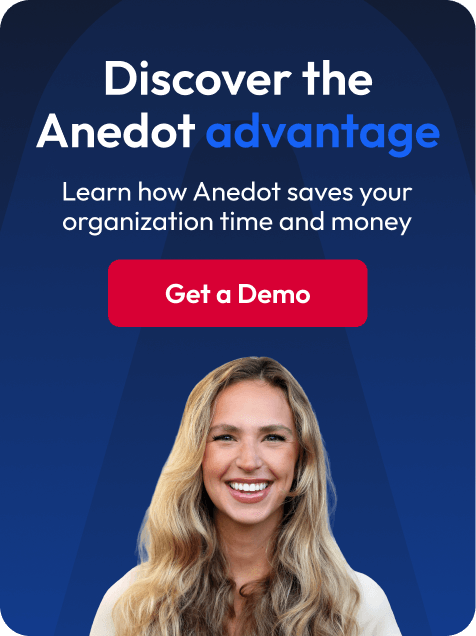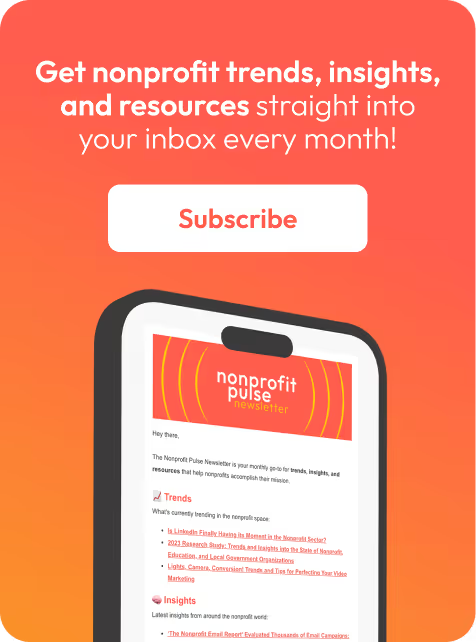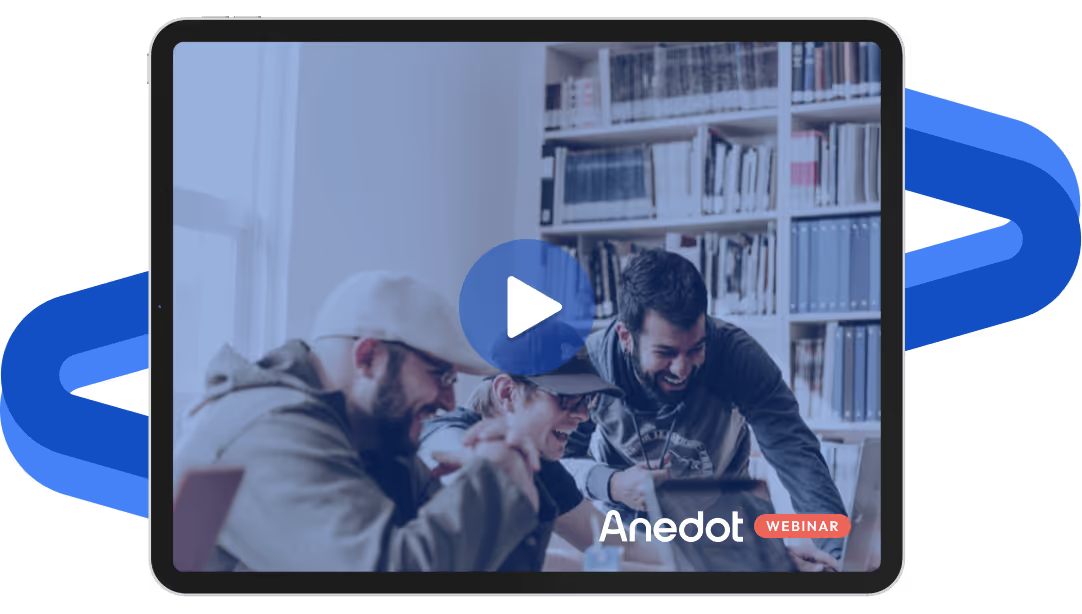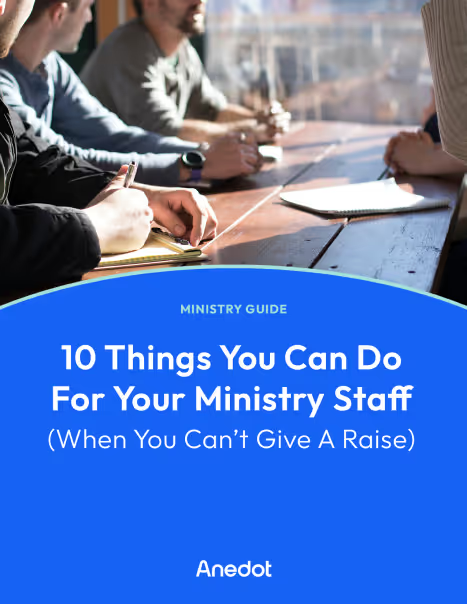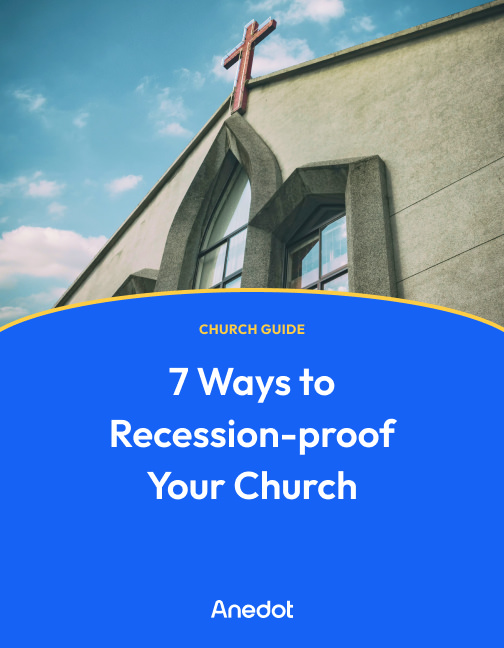Podcast episode transcript ↓
Josh:
Donor advised funds, or DAFs, are on the rise. But what does this mean for nonprofits and charitable giving?
I'm Josh with the Anedot and welcome to Nonprofit Pulse, where we explore trends, insights, and resources that help nonprofits accomplish their mission.
On this episode, we're joined by Peter Lipsett on the topic of how donor advised funds benefit nonprofits.
Peter is the Vice President at DonorsTrust, where he drives growth through outreach, cultivation, and marketing.
Hey, Peter, thanks for coming on the podcast.
Peter:
Absolutely. Thanks, Josh.
What is a donor advised fund?

Josh:
So today we're going to be talking about donor advised funds.
And for probably, you know, a large percentage of our audience, they may have heard about donor advised funds, but maybe don't know too much about them or how they really can serve nonprofits.
So maybe just starting out. What is a donor advised fund?
Peter:
Yeah, so donor advised funds are a terrific charitable vehicle. They we like to think of them as kind of a charitable savings account, like a health savings account for your charitable dollar.
Allows donors to put dollars away into a fund hosted by one of many providers, about thousand providers out there, and they immediately get a tax deduction.
And those dollars are there to be invested at the fund, can grow tax free or be ready to deploy to charitable causes as soon as the donor is ready.
And, you know, there's lots of different benefits to the donor advised fund that we could we could go through.
But the most important thing, particularly for charities out there, you know, is just they're not going away. They are growing.
I think the Donor Advised Fund Report that the National Philanthropic Foundation puts out showed that there was a 27.6% increase in the number of donor advised accounts between 2020 and 2021.
Now, there's more than 1.2 million, and that was, you know, a year plus ago. So there's even more now as we've seen at DonorsTrust and we hear about it all these other donor advised funds.
So it's a great tool. It simplifies giving for the donor.
And I think there's some good benefits for the charities as well.
What are the benefits of a donor advised fund for nonprofits?

Josh:
Yeah. So let's talk through that.
How are donor advised funds currently serving, you know, nonprofits, benefiting nonprofits?
Peter:
Yeah, a couple of ways. So one, from a donor service perspective, if we want to keep the donor center front of mind, it allows donors to give in an easier way.
It gives them another platform, another vehicle lets them manage their giving.
All of the benefits that the donors get accrue to the benefit of the nonprofits, because it's really important to remember that a dollar that goes into a donor advised fund is a dollar that has to go to charity.
Right? It's not a dollar that maybe can later go to buy a Maserati. It's not a dollar that can go to the college savings fund for the kids.
It's got to go to charity one way or the other. A charity you like, a charity you may not even know about yet, but it's going to go eventually to charity.
And so the donor advised fund can work with organizations in a lot of different ways.
One thing that the smaller donor advised funds can do and be a partner for the grantees out there is you know, we talk to a lot of organizations.
You're not going to see that necessarily at some of the Fidelity charitables, the Schwab charitables, the really, really big ones.
But your community foundations, your mission driven donor advised funds like we are, they are talking to grantees and that means they have expertise in the areas that the donors care about.
And so if you come to me and tell me about your charity, then I can turn around and tell a donor about it.
That happened yesterday. I got an email from a social entrepreneur who's got a new venture starting up, and I forwarded on to a donor that I knew had a real interest in that area.
I didn't tell him he should give. I didn't, you know, browbeat him or anything, but that donor probably wouldn't have known about it otherwise.
So that's one place where particularly nonprofits should build those relationships to the extent they can with the smaller donor advised funds and the community foundations in their area.
Addressing some common concerns about donor advised funds

Josh:
So what are some of the concerns that you all see as you, you know, interface with donors and and nonprofits?
You know, what are some of the concerns and what would you say to maybe assuage some of those concerns?
Peter:
Yeah, there's a few concerns that you hear a lot.
One that we face kind of on the mission driven side, some of these single issue, mission driven donor advised funds that are working within a space where there's other nonprofits.
I think some nonprofits kind of think that the donor advised funds out to, you know, get their donors to steal their donors.
And we have to remind people, no, that's not true. We're just a vehicle.
Frankly, as I just said, we should be a partner in all of this, that one doesn't come up as much. But it could be the bigger ones that you hear a lot about.
One of them is this idea of donor advised funds is just big warehouses of wealth and the other is around privacy.
"Donor advised funds are just big warehouses of wealth"
Peter:
So around the warehousing one, that kind of assumes bad faith in the donor in themselves and then the donor advised fund provider.
We don't see that.
We see donors come to us because they want to give to charity, not because they want to let money sit parked for long periods of time.
Sometimes it may sit for a little while as they get their ducks in a row.
But I don't find a lot of good faith in that argument.
And the flip side is that time, that ability to for donors to put that money into a donor advised fund, let it sit there and let it grow means that they can give that money more strategically later.
So no, maybe they don't know where they want to give it now, but they can make a decision later, which means your donor cultivation efforts matter over the long term because they may have dollars sitting aside ready to be deployed in a bigger way than you even realize so far.
"Anonymous giving through donor advised funds is a concern"
The other thing that I think a lot of nonprofits worry about with donor advised funds, because it's a bit more acute, is those gifts that come from a donor advised fund anonymously.
So that is one of the benefits for many donors to be able to give from a donor advised fund anonymously.
It's something they can do because the gift that the nonprofit receives is a gift from the donor advised fund.
Right. It's the trail of ownership. It actually comes from the donor advised fund. So it's one of the funny quirks of it.
And that means that the donor advised fund can say this gift was given anonymously by one of our donor advisors for the purposes of X, Y, Z, and that's within the right of the donor.
Donors have a lot of different reasons that they want to be private, from religious reasons to not wanting to get their name dragged through the mud because it's out of favor cause or maybe their wife doesn't like the cause, but they wanted to give it to it anyway.
Whatever it is, there's lots of reasons donors want to be private and to be able to enable that is, we think, a benefit.
And it's also something that the organizations, I think, should be mindful of just in terms of respecting the donor.
Now, I will say some, not necessarily every donor advised fund will do this, but we will certainly do this.
Others will as well. If you get a gift that comes anonymously to your organization and you still want to thank the donor, send a note to the donor advised fund and say, hey, will you please pass this on to the anonymous donor?
We understand you can't tell us who it is. That's fine. But if you would pass this on, that'd be great.
And, you know, pass your thank you note on. And the worst that the donor advised fund could say is, no, we're not going to pass it on. But most likely they will do it.
Josh:
Yeah, I love the privacy piece with donor advised funds, and I've seen and known some folks who have used them in the religious space, whether at churches, who they want to give to multiple churches or even religious affiliated nonprofits wanting to give without, you know, having that that spotlight on them as a major donor.
What is the future of donor advised funds?

Josh:
So you mentioned previously, you know, just we're kind of at the beginning or maybe not the genesis of donor advised funds, but still in the kind of the wild, wild west, especially if you look at legislation around it, there's not a lot of legislation right now.
What do you see in the future? You know, how donor advised funds may evolve and may help and serve nonprofits in the future?
Peter:
Yeah, well, there is some legislation that's out there that's floating.
It seems to be on a dead end course right now that could create some required giving over some period of time.
We, maybe not surprisingly, aren't big fans of that legislation, mostly because we think ultimately it's going to hurt the donor advised fund as a tool, which then hurts the donor and gives them fewer options in terms of how they're going to give.
And also some of these bills disrespect that privacy aspect pretty significantly, which, you know, we have real qualms with, you know, in terms of other ways that the DAF will change and grow over time.
You know, I don't know. I think the biggest thing to remember is this is going to keep growing.
If there's no sign of this letting up that you're going to see more and more people turning to DAFs.
And it's not just the rich and wealthy people who are using donor advised funds.
I mean, I've got a donor advised fund, my wife and I use it for all of our giving because it makes it easy to send money there every month, let it accrue, and then we can do our year end giving, usually around the beginning of the year, because Christmas is kind of a busy time to try to do your year end giving.
We've handled the tax piece, you know, we're not giving Scrooge McDuck levels of checks away, but it's meaningful for us and, you know, meaningful for some of the nonprofits we're giving.
And that's true more and more for people across the spectrum. And so don't just assume that your donor advised fund givers are really, really wealthy.
And don't just assume that that people who are giving out of cash may also not have a donor advised fund somewhere else.
How nonprofits can engage donors with donor advised funds

Josh:
So you know here at Nonprofit Pulse, we’re speaking to nonprofit leaders you know helping them you know explore trends, resources, insights that really help their nonprofits accomplish their mission.
What would you say to those who are looking to get the donor advised fund conversation started in their nonprofit? What would you counsel them?
Peter:
Again, kind of going back to the fact that they're not going away. Right?
And many of your donors are giving to the nonprofits through donor advised funds anyway.
And then probably you're getting gifts from donors who have donor advised funds who may or may not actually completely understand even what their own donor advised fund can do. Right?
Their wealth manager said, you should really set this up and they've got it and they're still trying to figure it out. And so you can be helpful to them to educating them.
But first it starts with the nonprofits making sure they understand the donor advised fund.
You know, take an hour, take a staff meeting, something just to make sure everyone on that fundraising team and the executives understand donor advised funds, at least at the core, understand that there's some limitations.
For example, I couldn't give to an organization, you know, a $5,000 gift to sponsor a table at their fundraising gala if I'm going to go to that gala and therefore get something in return, anything that I get in return can't be supported through the donor advised fund.
So that's a small thing. But if you're on the development side, if you're on the fundraising side, you're looking to get those dollars in, the donor may not know that that's a stipulation.
So help educate them. They're going to appreciate that.
Likewise, if you are part of a development shop and you get a gift from a donor advised fund, you don't have to send a tax receipt. In fact, you should not send a tax receipt. Right?
But that doesn't mean you shouldn't acknowledge the gift. I got a letter the other day from an organization I gave to, and it wasn't a tax receipt, but it was still a thank you for the gift that we had given through our fund.
And and so know that there are slight differences in that communication, but it doesn't mean you shouldn't be communicating. And then you know what?
This was a great piece of advice that I heard many years ago, that if you are a nonprofit, you should have something in your database, HubSpot or Salesforce or whatever you're using that allows you to track if a donor is giving through a donor advised fund.
You know, if they're giving through a foundation, you probably have a foundation entity set up, maybe do soft credits, etc.
But if you're getting it from a donor advised fund, you're probably treating it like an individual gift. And that's fine.
You do what you're going to do on your side, but make sure that you've got some indication so that, you know, if Josh sends me a gift, I can put a checkmark that says he likes to give to a donor advised fund.
That matters because when you're going to that donor, you can know that they do that and you can have this intelligent conversation and say, hey, you know, we'd like to ask you for another $5,000. You can give it through your donor advised fund again or in these other ways.
And that just shows that you're paying attention, shows you're knowledgeable.
It also means if somebody's got a donor advised fund, they very well may have money in that donor advised fund for future purposes.
And so that means that could be a donor that you may want to mark and note, if you have a capital campaign, if you've got a budget shortfall, if you've got, you know, some issue where you may need some additional money, foundation giving right now as we speak here at the beginning of 2023 is kind of depressed because the stock market was depressed.
A lot of foundation assets are down. But go to those donor advised fund donors because they probably have some dollars and can maintain that giving aren't going to have to necessarily dip because the stock market is all crazy.
And that's a valuable, valuable place to turn when you're in need of need of some stuff.
Closing thoughts

Josh:
So, Peter, what what are some resources you could recommend to our listeners?
Peter:
Yeah, one of the things that I think everyone should do is look at that National Philanthropic Trust's Donor Advised Fund Report just to understand the landscape.
If you're new to this, if you're still trying to get your sea legs about you, read that report and then you'll understand that there's, you know, the national organizations, there's community foundations, There's what they call single issue, which I call mission driven donor advised funds.
And there's different types, there's different purposes, but they're all growing. And so I think that's a good resource. If you've got a community foundation in your community, then I would try to set up a meeting, I would try to talk to them.
Or if you're an ideological organization, you know at DonorsTrust, we work with a lot of conservative, libertarian organizations.
A lot of them turn to us and try to talk to us, get meetings, put us on their lists. We welcome that because we want to know what's going on.
And so work within your space to find the groups that align with you so that you can talk to them, let them get to know you, and that could accrue to your benefit later.
We've got a resource called Six Reasons to use a Donor Advised Fund, for donor facing, other organizations have things like that as well.
Download some of those, understand some of these benefits and you know, kind of think long term about the donors and how they're giving because because it can accrue to your benefit as an organization.
Josh:
Awesome. Yeah. So, you know, like I said on the podcast, we want to explore trends, insights, and resources.
And I really do believe donor advised funds are going to be trending up in 2023, you know, and really for the rest of the decade, you know, just seeing the growth over the past five years, it's been remarkable.
Peter:
Yeah. And, you know, one thing that I should have mentioned earlier, when we're talking about ways that the donor advised funds can be helpful to nonprofits, they really do kind of serve as a rainy day fund.
I mean, I touched on this a little bit a minute ago that we saw this a lot of the donor advised funds saw this in 2020, that first half of 2020 as the pandemic was coming on, as the stock market plunged, unemployment hit, nobody knew what was going to happen.
And nonprofits were really, really riled. But we saw donors who had money in a donor advised fund were able to keep giving. They had those dollars set aside even faster than the foundations.
And, you know, to their credit, foundations stepped up a bit in 2020. But we saw this in 2008, 2007, 2008, 2009 as well, when the economy was kind of bumpy, there was more level giving through the donor advised fund because those dollars were there.
And so those donors could continue to give. And so they really are charity’s rainy day fund, and they are they're really, really valuable in that way.
Josh:
Awesome. Peter, thanks so much for coming on and sharing.
Peter:
Absolutely. Great to be with you.
Josh:
Hey, thanks for checking out this episode!
If you enjoyed it, please share it with others or leave us a rating and review.
To find show notes and resources mentioned in this episode, visit Nonprofitpulse.com.
There, you can also sign up for the Nonprofit Pulse monthly newsletter where we send the latest trends, insights, and resources to help nonprofits accomplish their mission.
We'll see you next time.
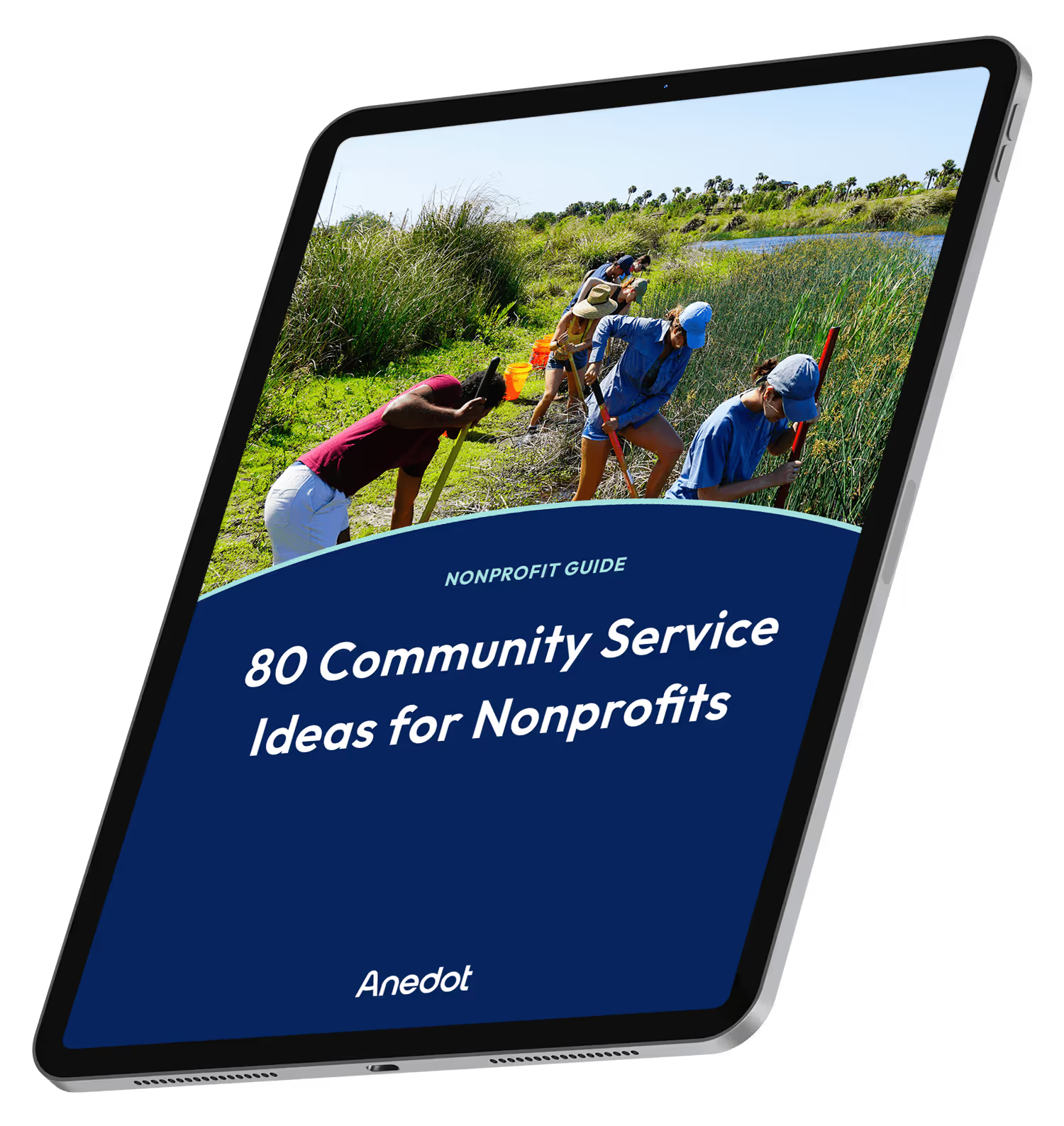
80 Community Service Ideas for Nonprofits

